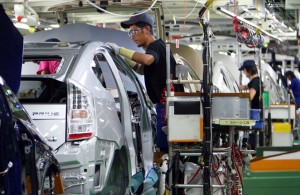
According to a new report, Toyota wants to improve the efficiency of existing plants, not add new ones.
Toyota is planning to halt the construction of new plants around the world for at least the next three years, according to reports coming out of Japan. The decision represents a shift from Toyota’s previous policy of building new plants almost annually.
Officials from the Japanese auto giant have not commented directly on the reports. “I cannot discuss our business plans, but we consider it important to boost investment efficiency to secure medium-to- long-term growth,” a Toyota spokesman said.
Toyota, which last year again became the world’s largest automaker, would concentrate its capital investment on existing factories, the Nikkei business daily said.
The company could officially announce the decision in a new management plan to be released in the coming months, Jiji Press said, as part of an overall effort to increase efficiency and cut costs. Like other Japanese carmakers, Toyota has been under intense pressure to control costs because of the steady increase in the valuation of the yen.
The new policy would basically put on hold through to the end of the 2015 fiscal year all plans for building new factories other than those already announced, the paper said. One sign of the impending change was Toyota’s decision to buy 50,000 units a year from a competitor’s new plant in Mexico rather than build its own factory there. Several other manufacturers, including BMW, Audi, Nissan and Honda, are building new plants in Mexico, as well.
Toyota, which expanded rapidly in several different parts of the world in the past two decades, also said last year it planned to build more cars and purchase more parts from American suppliers. But it did not announce plans for new factories in the U.S.
However, Toyota does plans to finish a new plant in Brazil where construction began last August on a new engine factory.
Overall Japan’s largest automaker now has about 50 overseas plants and just under 30 domestic ones.
The reports from Japan, however, did not address what is fast becoming Toyota’s most challenging market – China.
Toyota said in late December that it sold an estimated 9.7 million vehicles in 2012, which likely put it ahead of General Motors and Volkswagen as the world’s biggest automaker.
The company expects to sell about 9.91 million vehicles in 2013, but both GM and Volkswagen have large and growing operations in China while Toyota has begun to lose ground in that dynamic market. Toyota dealerships in China were ransacked and factories forced to close after anti-Japanese protests erupted as the two countries feuded over claims to tiny islands in the China sea.
By deciding not to build more plants in China, and India, Toyota could wind up ceding the market to VW and GM.
The WardsAuto /AutomotiveCompass forecast, which is updated monthly for clients, projects growth in all global regions through 2018, with total vehicle output increasing 23% over the next six years. The report highlights the China-led Asia-Pacific region’s increasing dominance, especially through 2016, when production in China alone will climb to a stunning 26 million units, a 7.5 million unit increase from 2012.
By comparison, production in the U.S., the No. 2 vehicle producer, is projected to increase by 1.3 million by 2016, while production in the third-highest producing country, Japan, is forecast to decline by 875,000 units over the next four years, as capacity continues to shift to other locations, the report said.

Maybe Audi will surprass Toyota sales or at least how many factories they have?
That should be the VW Group, not Audi per se.